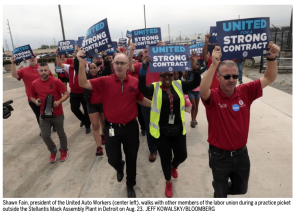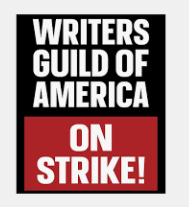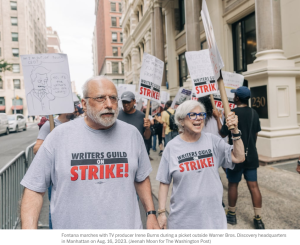
Dad’s business card
I come from Detroit. My family was in the automotive industry. My great uncle, Meyer Prentis (Uncle Meyer) was the Treasurer of General Motors when it was the largest corporation in the world. My dad’s oldest brother was it’s comptroller. My dad worked for the Chevrolet division in Flint, MI before WWII, but upon returning from the war, struck out on his own. With a partner, he opened a used car lot, which morphed into a DeSoto dealership (anyone remember that marque?), then a Chrysler dealership. You see his business card as the Featured photo. I used to joke that I had motor oil running through my veins.
Though I was a youngster at the time, I saw how unions helped to build out this country’s middle class. But I also know the power (and corruption) of the UAW and Teamsters (indeed, Shawn Fain, the current head of the UAW just came to power recently when the corrupt former head was overthrown).
My father already was in business trouble when the UAW went out on strike in 1967. His partner wanted to leave the business, insisting he be bought out. I believe my father completed that financial obligation in 1972. Long before that, he had expanded the physical footprint of the dealership, adding a large wing. In order to do so, took out a big mortgage on the business. With a long strike, he ran out of inventory to sell. He was forced to sell the dealership at a financial loss back to Chrysler. He went to work for a cousin who owned a Buick dealership (some years later, he left the automotive industry altogether; he turned to professional philanthropy for his living). I was still a kid at home and the finances of our family were not discussed with the children, but I felt the impact.
I am not asking for sympathy, merely stating the facts. No one thinks about who gets hurt during a lengthy strike. I have no documentation, but I would not be surprised if some of my wealthier relatives helped to pay for my brother’s and my private college tuition. Our aunts and uncles were proud of our achievements and wanted them to continue. Or perhaps my dad had savings set aside for the tuition. I don’t know and no one is now alive who can answer these questions. I only knew that I was filled with gratitude to be in the position I was in and didn’t want to waste a single precious moment that was given to me.
My dear friend Christie and I were visiting my parents before driving up for our first visit (of what became a decade-long tradition) to the National Music Camp when Jimmy Hoffa, disgraced, paroled, ex-head of the Teamsters went missing from suburban Detroit on July 30, 1975. For years after, we joked that we did it and we knew where the body was buried. (For sure, the Mafia did it and the body was never found.) The Teamsters were another huge presence in Detroit, one with big Mob ties. I was even quite familiar with Machus Red Fox, the restaurant where Hoffa’s meeting was set and he was last seen. It was a nice restaurant that my parents took me to on special occasions. Yes, Detroit is a union town, with all the ramifications.
In the aftermath of the market meltdown in 2008, the UAW gave the Big Three automakers huge concessions (the US government bailed out the car companies, but those loans were entirely repaid). Now the UAW is on strike against the Big Three. They are trying to make up what has been lost in the intervening 15 years. They are asking for close to a 40% pay increase over 4 years, a four-day work week, defined pension benefits, better health care, no-cut jobs, no more tiered hiring, limit to hiring temporary, non-union employees and more. They are worried about the coming revolution they foresee with the production of electronic vehicles. These seem like reasonable demands, given how well the auto industry has done in the intervening 15 years, yet the workers have not gotten commensurate increases as the auto industry is once again flying high, and in most industries, defined pensions are a thing of the past.
The pandemic hurt the car companies, with all the supply chain issues, and no one was renting cars, so the rental car companies shed their inventory and did not replace them for a while. But now, everything is booming. It takes a long time to source a car to purchase and prices have soared. I understand the UAW’s frustration and wish to catch up. But how much and how quickly? I have followed the deliberations as best I can. They certainly are entitled to their share, as they cut back during the time of distress. Time will tell how this all works and who pays the price (the consumer, the car companies, the workers themselves, as they lose weeks of pay?).
It is true that the wages have fallen in real dollars for work, while the CEOs are making huge salaries and share prices are soaring. None of this is fair, but the Union’s demands seem huge. They all must negotiate in good faith, rather than trying to “hold the other hostage”. Steve Rattner, Obama’s “car tzar” and an auto policy expert, wrote an op-ed in the NYTimes recently entitled, “Killing the Golden Goose”, positing that asking for too much and holding firm on the demands is a lose-lose situation.
Of course, I am not privy to the negotiations. The automakers have already offered a 20% pay increase. There are other demands that may not be met and the longer the strike goes on, the more it hurts their own workers, everyone in the supply chain (as it did my father, back in the day), the economy in general. Who does this help? Draw your own conclusions, but I would say, if the economy goes to hell, we are all losers.
This week, President Biden walked the picket line (with Shawn Fain looking on), offering full-throated support. TFG went to a non-union shop and talked about all that he did to support unions (pundits refute those claims, like everything else that comes out of his mouth; his audience, holding signs, was seeded with his supporters, who were not union members, just props for sound bites).
In August I heard an interesting panel discussion comprised of two members of the Writer’s Guild and one member of the Director’s Guild talk about the concurrent Writer’s and Actor’s strike and the various thorny issues being worked out that have risen to the top of the pile. Panelists were: Doug Liman, director of huge hits like “Mr. and Mrs. Smith” and “The Bourne Identity”, Misan Sagay who wrote “Belle” and Scott Frank, who has a long list of accomplishments, but most recently wrote, produced and directed “The Queen’s Gambit” (which, as the panel moderator said, “Got us all through COVID”). Misan lives in the UK, but is a member of the WGA, so does have that perspective. They covered an interesting set of topics that I will try to encapsulate for this discussion.
Major topics include size and usefulness of “writer’s rooms”, as a way to learn the craft, as a step ladder on a rung up to larger production jobs, as a creative outlet, or as a hindrance to creativity. Another topic is payment of residuals which has been blown apart with the move to streaming services. And the huge elephant in the room is the use of AI, both as a tool for writing, but also, instead of actors. So those were the big topics that were being negotiated. Each person on the panel had a point of view.
The topic of the writer’s room drew a mix of views. Doug Liman really liked them, thought they were a great source of creativity, but didn’t want the unions to set a fixed number of people to be present. Misan also likes them as a way to learn the craft and to be used as a stepping stone to bigger jobs. Scott Frank thought they were useless, a hindrance to his creative process. Doug’s warning was if they become like the Teamsters, where a set number have to be present, regardless of what they do or contribute and only add to the cost of production.
Residuals payment has changed dramatically with the streaming services. With networks, when shows were sold into syndication, residuals were paid in perpetuity and were a healthy way for actors and writers to earn a living. With the streaming services, writers are paid an upfront (frequently large) fee to write a show. There are no residuals no matter how many times the show is streamed. The network does not share that information. So the model is quite different and that is a major sticking point that is being hashed out.
Another big item is the use of AI, both in script development and acting. Doug Liman predicted that extras will be no more – they will all be generated by the use of AI. That was startling to hear. But the biggest fear was to hear the writers talk about chatbots writing scripts “in the voice of” famous authors. Some thought they might use AI to give them ideas, or a first draft, but THEY want to control that, not some Hollywood-type who is going around them. This is unknown territory and they want to get their arms around it now before it gets out of control.
Tom Fontana, hugely successful writer and producer of such hit shows as “St. Elsewhere”, “Homecide, Life on the Streets” and “Oz” was the subject of a large profile in the Washington Post on September 7. This is his fourth strike and he is angry! The stakes have never been higher. He says that at age 71, he’ll be OK, but the world he grew up in has changed so much that he wants to be sure that everyone he mentors will be OK.
The strike was just settled and the topics the panel discussed in August were resolved. Residuals will be paid on streamers, there will be writers rooms (I don’t know the exact terms of that part of the deal), something was negotiated about AI, but I don’t know exactly what. Actors and writers who are not at the top of the heap were desperate to keep their apartments. They can’t pay their rent. Big concessions were made; the writers got much of what they wanted. I suspect the actors will settle soon too. The talk shows will be back this week, but productions on scripted shows will take much longer to get back into production.
I saw in the paper yesterday that well-known authors like John Grisham and George R.R. Martin are suing OpenAI for training ChatGPT on their novels so that it can produce writing in these authors’ voice, using details that show the AI must have read the work, and is using it without copyright permission. AI continues to disrupt.
Now hotel workers in Las Vegas have authorized a strike. And the beat goes on…
Retired from software sales long ago, two grown children. Theater major in college. Singer still, arts lover, involved in art museums locally (Greater Boston area). Originally from Detroit area.






Thanks for giving an inside look at unions and strikes, particularly in the auto world. You clearly show how there is always more than one side to a negotiation, the process can be painful and power can corrupt. An important point is that if workers have representation, they can actually have a negotiation and some legal protections. Skill and compromise is required of both sides in getting to “yes”, but no representation, no union, no negotiation, no protection. It seems that younger generations are learning this again.
You make excellent points about the skill of negotiations, need to compromise and legal protection, Khati. But power can (and often does) corrupt, so being vigilant is necessary.
The need to be vigilant against corruption is SO TRUE, as we are seeing play out in our courtrooms today. May there be accountability!
So true, Khati!
Once again, our common upbringing as Motown girls influenced our feelings about unions.
I can’t wait to read your story, Laurie! I certainly felt the impact of the UAW and Teamsters keenly.
The beat goes on indeed Betsy, and every day it seems there is more and more of concern. TFG and his base, Covid, climate change, and Putin and Netanyahu seemed a lot to worry about, and the recent strikes and now AI.
Heaven help us.
Maybe “duck and cover”? For sure, crazy times, Dana. I’m not unhappy to see McCarthy lose his speakership, but what will the Repubs do next? Particularly with the countdown to another budget crisis. The goal seems to blow the place apart.
And we always thought, it can’t happen here!
We just have to have faith that we can still right the ship.
Betsy: Your essay is a great example of oral history–the combination of erosional experience with compassionate awareness of events.
Good writing like yours pays attention to nuances and to competing values.
I hope someone will add your work to an edited book on observations of major U.S. events.
Thank you so much, Richard. There was a lot to say on this subject!
Thanks for including the Writers Guild strike in your story. My son Ben walked the picket line, so he has now done something I’ve never done. Thankfully, that strike has now been settled, as you say, but the SAG-AFTRA strike continues.
I think everyone is relieved that the Writer’s Guild has settled (from what I understand, they got much of what they wanted). Good for Ben for standing up for his rights. This is being called “the summer of strikes”, though we are well into autumn. Somehow, the unions fell out of favor since the 1970s, but seem to be gaining momentum again.